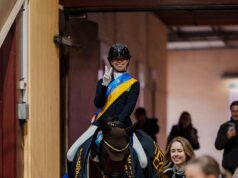By Inga Wolframm
Grapics: Inga Wolframm
At a time when sporting performance records are featuring heavily in breeding decisions, a horse’s high level results can significantly impact their post-competition earning potential. In this context, and perhaps more than ever, the eyes of breeders around the world will focus on the upcoming Paris 2024 Olympic Games - especially on the subjectivity of elite dressage.
Most aesthetic sports where judges subjectively rate performances can suffer from issues like systematic errors due to biases. Equestrian dressage is defined through the intricate interaction between horse and rider. Assessing these interactions can be particularly complex, often exceeding human processing capabilities. This study focuses on whether the current dressage system predisposes international judges to using biases, and inadvertently favours certain horse-rider combinations.
The study examined 510 judging scores, gathered from seven 5* Grand Prix dressage events held between May 2022 and April 2023 using Multivariable Linear Regression Analysis. The effect of different factors, such as whether riders competed in their home country, if they had the same nationality as the judges, their starting order during the competition, and how they were ranked according to previous performances were analysed. Results showed that all these factors influence the final dressage results. In order to assist judges in providing objective, transparent scores, a clear evidence-based set of judging guidelines should be developed, which would prevent judges from having to resort to cognitive short cuts. That way, the complexity of judging is reduced, making scores more objective, transparent and fair.
This study focused on five predictor variables in relation to Total Dressage Score (TS):
• Home
• Same Nationality
• Compatriot
• FEI Ranking
• Starting Order
The model accounted for 44.1% of TS variance; FEI Ranking, Starting Order, Compatriot, Same Nationality, and Home were statistically significant (p < 0.001). Judges exhibited nationalistic and patriotism-by-proxy biases, awarding significantly higher scores to riders from their own countries (p < 0.001). FEI Ranking and Starting Order also influenced scores significantly (p < 0.001). These biases, combined, created a cascade effect benefiting a specific group of riders. To address this, measures should be taken to develop a more objective judging system that is based on unequivocal, transparent, and evidence-based criteria and supports the continuous development of a fair, sustainable, equine welfare orientated sport that fosters societal acceptance... To read the complete article you need to be a subscriber
CLICK HERE TO SUBSCRIBE TO BREEDING NEWS
SUBSCRIBERS CAN READ THE COMPLETE ARTICLE BY LOGGING IN AND RETURNING TO THIS PAGE




